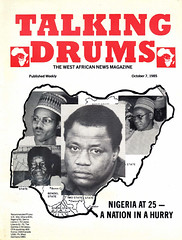Grappling with military regimes in Africa (2)
by Amusu Kwaggrey
Have military regimes become a permanent feature of African politics, indeed politics in developing countries? What are the motivations for military usurpation of power and can an effective solution be found to counteract coups. The writer concludes the article.All over Africa, military rule has proved to be disastrous and unanswerable to people's plight. Ghana, prior to the 24th February 1966 incident, was on a progressive move towards total independence, but successive coups battered down that fine and promising country. And today, the military regime in Ghana is deceiving itself and the world that the country is fast recovering from the monstrous damage which the soldiers of the past had done. Ghanaians on the other hand, are being deceived that the installation of so-called people's committees is tantamount to democracy. What is going on in Ghana is nothing more than a palliative, the real problem remains.
Idi Amin's eight years in power in Uganda was a complete disaster. Bokassa was a total failure in his 'Empire'. The whole sixteen years of military rule in Sudan under Numeiri gathered no moss.
Military rule is now eleven years old in Ethiopia but nothing remarkable has been achieved up to date. While the people are starving the government spent over $2 billion on planning the tenth anniversary of the so-called revolution.
The picture is not different in Zaire. Over two decades of military rule, the situation remains deplorably the same as it was during the colonial times. Mobutu, acting like King Leopold, turned that richest part of Africa his personal property and is working hand in hand with the multinationals and the imperialists to chisel away riches of the country and impoverish the people.
Thirteen years of military rule in Nigeria could not put her into better shape. In Burkina Faso, the condition of the people is neither better. The wild assertions of Thomas Sankara only demonstrate the magnitude of confusion of his political perspective. He has no consistent ideology to effect his intentions.
In Liberia, the worst is being done under the leadership of Samuel Doe. All is not well with Kountche in Niger Somalia groans under Siad Barre. Togo is in chains, Benin is in a mess Congo is not faring well. Chad is scattered. Mali is poorer under Ali Traore, Equatorial Guinea is at the verge of collapse and now seeking re-colonisation from Spain, the situation in Guinea-Bissau is not impressive, Kolinba finds the going tough in Central African Republic, Sudan is in the throes of anarchy and in Uganda, the new military regime appears to have no healing wand for the Uganda trauma.
All over Africa, the justification for military rule is becoming less tenable due to its repressive nature and inabili- ty to find meaningful solutions to the sufferings of the people. More often than not the problems are aggravated, pushing the poor masses into forced frustration. Such is the state of punish- ment which the people of Africa are being subjected to under military regimes. The most painful aspect of it is that the masses are denied the opportunity to express their grievances effectively. The press which is supposed to speak for them has got its mouth padlocked by decrees.
The immense sums of money that are spent on the upkeep of Africa's armies must be challenged and questioned because the maintenance of armed forces constitutes one of the biggest drains on a country's economic and financial resources.
In Africa, we need every kobo or pesewa for development but every year a large proportion of national income goes to furnish the armed forces at the expense of the welfare of the masses.
In view of its frequent rush to seize power for vague reasons and maintain itself in power against the will of the people, the army is losing its relevance and traditional role in Africa. In one of his books, Nkrumah pointed out that "There is little justification for the enormous sums of money spent on the armies of Africa because Africa is not threatened territorially by any outside power. The border disputes which exist between certain African states, most of them legacies from the colonial period, are all capable of peaceful solutions.
"The struggle to end the remnants of colonialism and settler domination are not being fought by professional armies but by guerilla forces . . . The only valid reason which could justify the creation of large conventional armed forces is the vital necessity to achieve the objectives of the Africa Revolution, that is the political unification of Africa, for which a unified All-African high command is an essential prerequisite".
One of the greatest crimes which OAU has committed against the people of Africa is its failure to stem the tide of military coup spread in Africa.
Haunted by the spectre of article three sub-section two of its charter, the OAU, throughout 22 years of existence, has never, on any occasion raised a protest against coup-mania Africa. All along, the organisation though fully aware of this abnormal development, chose to remain reticent and indifferent on the whole affair while the continent is allowed to be tormented and destabilised by military coups and rampant political upheaval - a trend which is not conducive to the well-being of the people.
The matter is becoming grave and will be monumentally suicidal for Africa to enter the 21st century with all of these uncertainties.
A way must be found to deal radically with the African situation to arrive at an eternal solution, and this can on be accomplished successfully within the framework of African unity. Such is the path we must follow toward our final redemption. And military rule, like colonial rule, must be abolished in Africa, and all military dictatorship and despotic regimes must be liquidated and replaced with the governments of the people, by the people and for the people, equipped with a strong array of democratic citadels to fight against coups.
